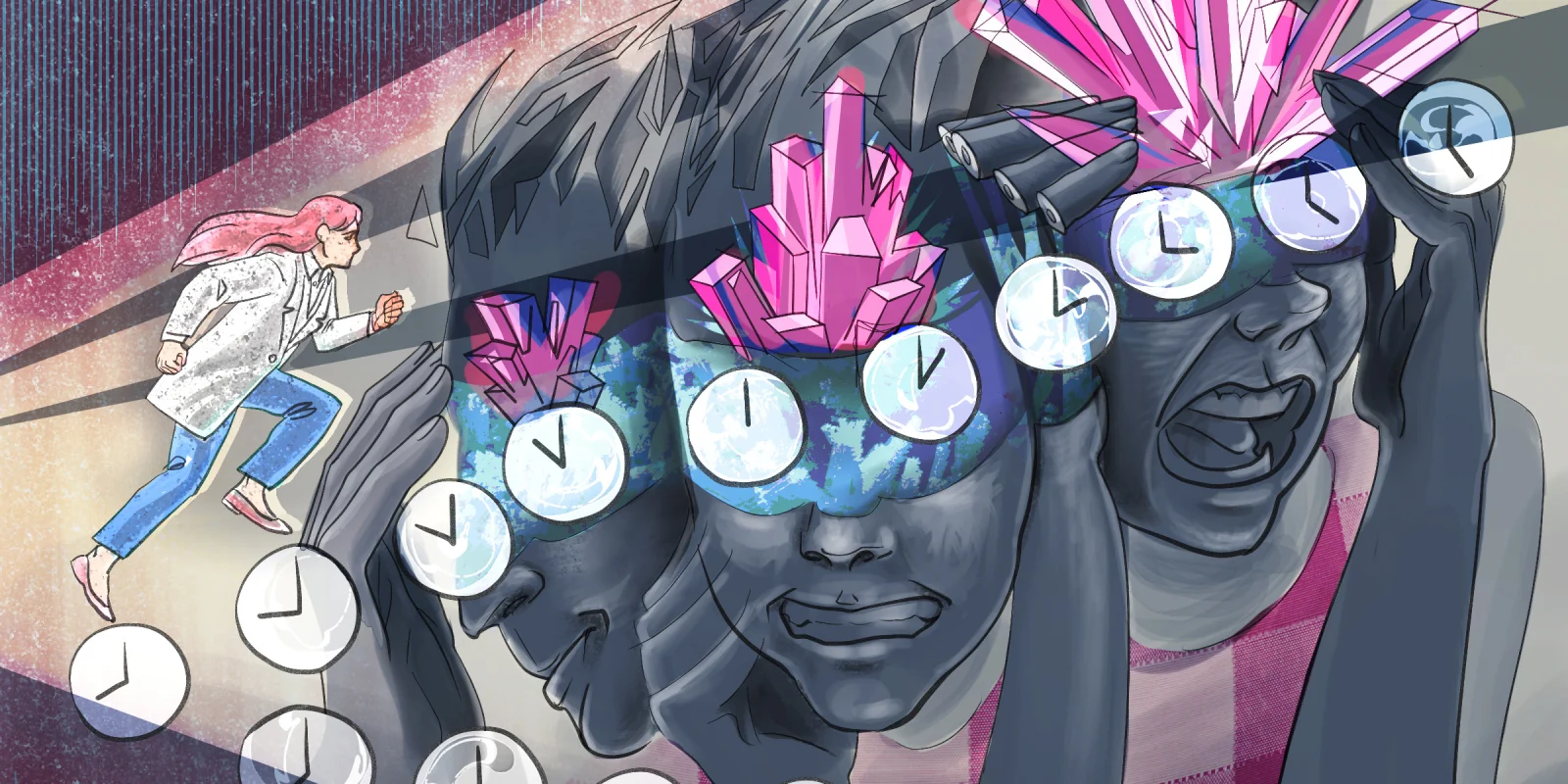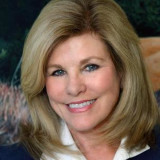Editor's Note: The following article contains depictions of sexual assault and homicide.
I was all alone in my medical office, hours after closing. Overhead, the fluorescent light was harsh. It was dark outside. Only a few years past residency, I wanted nothing more than to be home drinking a glass of red wine with dinner. Instead, I was returning phone calls, reviewing test results, and charting after a swamped day. It seemed the paperwork would never end.
A moment later I heard a rustling in the outer office. I immediately sat up in my chair, hyper-alert, my mouth dry. Any former fatigue was gone. I was no longer alone. Then I saw him — a stranger in the hall, wearing a dark hoodie and looking very out of place. How did he get in? I rose from my desk and walked toward him, resolute to show no fear.
“Who are you? We’re closed. You’re not supposed to be in here,” I said in my most authoritative voice.
“Uh, I’m looking for a job,” he replied. Being nighttime, everything should have been locked up tight.
“You’re in the wrong place, Sir! Leave now.” I pointed to the door and stood with my backbone straight, talking tough, in control. But my knees felt weak.
He didn’t leave, instead taking two quick steps and pulling a black gun from his waist. My chest fluttered, my heart rate raced while my gut seemed to fall. Grabbing my arm, he pushed me through my open office door. My purse was sitting on the desk amid the stacks of paper and half-empty cup of cold coffee. “Take it,” I stammered, “just leave.” He gripped my arm tighter, pointed the gun to my head and dumped the content of my handbag on the desk. Small change fell out. How I wished there had been more money.
“Come on,” he snarled and grabbed my arm again, this time pushing me toward the small bathroom in the back of the office. I knew deep in my gut, deep in the synapses of my brain, that he had been through the entire office and knew its layout. And he knew that I was alone. I suddenly realized that it wasn’t just money he was after. In my profession, I have seen how quickly a person’s life can change. I know that bad things, terrible things, can happen to people in a blink of an eye.
Something I had once read flashed across my mind: Don’t ever let an assailant move you to a different place. Fight to stay where you are. But that advice wasn’t practical when he had a loaded gun to my head and I had nothing but a pen in the pocket of my white coat.
He forced me into the tiny bathroom in the back of the office and clicked the door lock. I knew this was bad, really bad, and my options had gone from terrible to really terrible. I could feel his hot breath. The black gun loomed large and to my horror I could see down the barrel to the bullets. He pushed me over the sink. I could see the sweat dripping down his forehead. There was no room to maneuver and the gun was actually touching my head. Every screaming fiber of my being was on high alert. I couldn’t think. I started talking. Rambling actually. Without any strategy except to stall.
“Come on, man. You seem like a nice guy. You don’t have to do this.”
“Shut up.” he barked. “Take off that coat and your clothes.”
I could feel my chest constrict, yet I kept talking.
“Hey, you must have a girlfriend. Tell me about her.” He pulled at my lab coat.
“What would your mom say if she knew you were here? Think about your mom. You’re too nice a guy.” He pawed at my clothing and broke the button on my pants.
“If you want drugs, let’s go to my drug cabinet. I think we can find something there.”
As he pushed the cold steel against my temple and tore at my clothing, I tried everything to relate to him and have him see me as a human being, not a thing. I was running out of both talk and time.
“Shut up, bitch. This gun is loaded. Do you get it? Quit talking,” he shoved me hard and ripped my pants down.
By now I was dripping sweat. I realized my attempt at bonding was failing, despite slowing the inevitable down. Suddenly my attacker stopped clawing when we both heard muffled sounds a few feet away, just outside the locked door. “Help!” I shouted. The door flew open and two security guards stood there, mouths agape, eyes like saucers.
Pop! Pop! that fire-cracker sound reverberated through the air as one of the two men slumped to the floor. The other bolted, running away while the shooter stepped over the fallen victim and suddenly he was gone too. Alone in the eerie silence, I watched those same fluorescent lights create strange shadows. There was no one left but myself and the young bleeding security guard at my feet. There I was, a traumatized young doctor, partially undressed, my vision reduced to black and white. A pool of black blood slowly expanded under his head onto the ground. My mind was a total blank. I wasn’t even sure where I was.
But still, I instinctively kicked into doctor mode, knelt down beside the crumpled stranger, felt for his pulse, and tried to assess the damage. I rolled him onto his back with difficulty, for he was heavy and limp. His shredded lower face was pumping blood. I used my white lab coat and the pants I’d been stripped of to apply hard pressure as he went into shock, going gray color and breaking out with diaphoresis.
“You’re OK. Stay with me. You’re going to be OK,” I kept whispering. “We got this. Look at me. Look at me.” His eyes saw nothing.
Another unarmed hospital security guard, making rounds, appeared down the hall. He took in the unfathomable scene: a half-dressed woman kneeling by his fellow worker laying in a pool of blood.
“Get help! Call 911!” I hollered. The guard wouldn’t come closer.
After what seemed like hours, help finally did arrive. I happily let the paramedics take over. The narrow hall soon filled with police and detectives. Even the hospital CEO showed up. “If I’m ever stranded on a desert island, I want you there,” he said, studying the bloody floor. I managed a weak smile.
The young security guard was taken to a trauma hospital and underwent surgery for a lacerated facial artery, transfusions, and jaw reconstruction. He surely would have bled out and died, had he been alone. After he recovered, he came back for a visit and was even my patient for a time until he moved away. He never worked as a security guard again and started college instead.
The would-be murderer and rapist was never found. The gun was recovered weeks later and I went to a line-up, but I couldn’t identify the shooter. For a long time after that night, I couldn’t be alone in an elevator with a man because it felt like that tiny bathroom where I had been confined. Even now, decades later, I experience a wave of fear if a man steps into an empty elevator with me
You never know how you’ll react in a life and death situation and hopefully you’ll never have to. Only when put to the test do you know if you’ll pass. I knew that night that I was a hero. I also knew I was a doctor. I understood viscerally what I have always known intellectually: that life can end in an instant and even the most ordinary events can suddenly become dangerous without warning. We are all vulnerable and face tragedy wearing many different cloaks. How we react can mean the difference between life and death. I survived a potentially lethal assault while reflexively using my professional training to save a man’s life under maximal stress. That night, I felt proud that I passed the test. All while working overtime.
If you or someone close to you has experienced sexual violence, please call the National Sexual Assault Hotline at 800.656.HOPE or visit the resources available at RAINN.org.
Do you feel you've passed your "test"? Share your results in the comments.
Dr. Brayer has practiced internal medicine in San Francisco for over 30 years and has served in numerous medical leadership roles. A trailblazer for women doctors, she was the first woman Chief of Staff at her hospital, was President of the San Francisco Medical Society, and she is the immediate past CEO of Sutter Pacific Medical Foundation. She has recently made more space in her life for writing and social activism. She just returned from a medical teaching mission to Rwanda.
Illustration by April Brust







